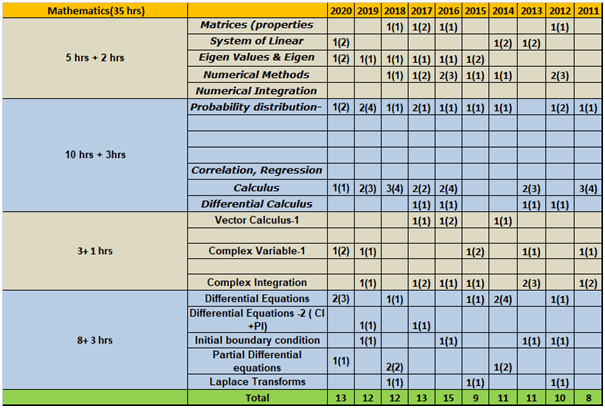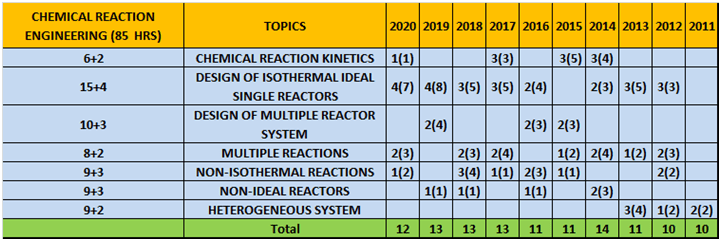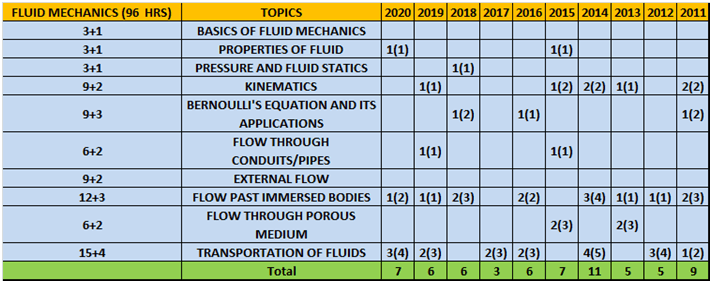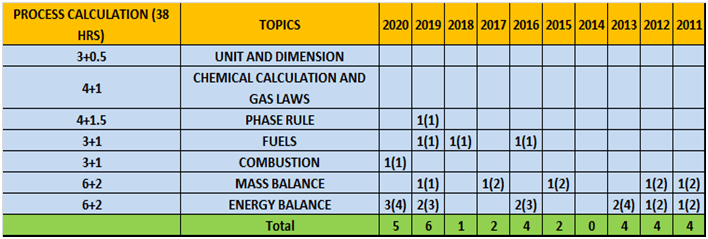GATE Study Planner Chemical Engineering(CH)
Introduction
Hi Warriors,
Please find a comprehensive GATE Study Plan for your GATE exam 2022 preparation. The number of hours considered in this planner is 3 hours per day (on an average). You can adjust number of hours as per your convenience. For instance, if you see the Master planner below, you will find we need approx. 220-250 hours for completing Stage-I. So if we study 3 hours, on an average, for 90 days = 270 hours, we can easily cover what’s given in the document.
Note: This plan is designed in consideration with students who have got top 100 ranks in GATE or any national level exam in the past few years
A similar plan is followed by many exam toppers and is highly recommended by most of The top faculties of the country. You will realize while going through it that a lot of research is gone In to make it helpful to you.
The following document contains:
- Master plan
- Flow of a subject which should be followed
- How to make notes
- How to do Test Analysis
- How to do revision
- Subject wise( topic wise) time devotion plan
1.Master Plan
| Stage – I | Stage – II | Stage – III | Stage – IV | Stage – V | |
| Notes + Gate Ques + Topic Test + Subject Test | GA = 27 hrs
Maths = 44 hrs EM = 46 hrs FM = 69 hrs SOM = 68 hrs
|
Thermo = 79 hrs
Manufacturing = 77 hrs TOM = 64 hrs |
MD = 40 hrs
HT = 52 hrs IE = 59 hrs |
3 FLT | 3 FLT |
| Extra Workout | One Mock with Analysis = 7 hrs | 2 Mocks with Analysis = 15 hrs | 3 Mocks | 3 Mocks | |
| Revise all 8 Subjects = 130 hrs | Revise all Subjects = 120 hrs | Revision 2 | Revision 3 | ||
| Total Hours | 254 | 357 | 286 | 125 | 140 |
2. Flow of Studies for Any subject:
- Notes
- GATE que for past 10 years topic wise
- Topic wise test on aspiration.ai
- Subject tests on aspiration.ai
- Extra practice que + revision of subject
3.How to Make Notes:
- If you attend lectures of any faculty through GATEFLIX then you can easily make notes. If you haven’t done so, go to online videos to do so. You may also go to Youtube:- Khan academy, Nptel or the latest and most popular are Gateflix videos.
- Make notes neatly as they will be very very useful while revision in the last 30 days. Use 3 colour pen to indicate important, very important and very very important concepts.
- Make a separate handbook for formulas. In exams 40% questions are direct formula based or implied formula based. Problem with students is that they tend to mix up formula. If you have this handbook of formula ready and have revised the things at least 2 times , I can guarantee you the 40 % marks.
- Don’t Xerox someone’s notes because the moment you write yourself then you can memorize the concept for a longer duration.
- Leave one page Space after 2/3 pages or after every major chapter. This is to ensure that if you come across any vital formula or Information or short trick while referring tests or reference book later then you may place That information in these spaces.
4.How to do a Test Analysis:
- Any test( Online or offline) need to taken in time frame.There is No point in taking the test without a time Limit.
- Don’t take any test without revision of Notes of the syllabus covered in the test. It will be a wastage if You just randomly take a test.
- Once the test time is over, don’t jump to answer Solution . Check the answer key and get To Know your score.
- Now follow a 3 stage process .
Stage 1: Go to the right ones and check whether you were confident of answering that question . If the answer is “yes” check the solution given in order to see which method was better( yours or the given in Book or online portal ). Adopt the best you like.
Stage 2: Go to questions which you got wrong. Try to fight with the question that why you got it wrong without looking at the solution yet. Try 3 or 4 times by re-reading the question or even refer notes. Maximum time it’s a silly mistake. These silly Mistakes can’t be zeroed but can be reduced by practicing more .Refer notes again if needed. In case you are still not able to click after a lot of Slumber, try to open the solution and check your mistake. If it was a new concept to you, add in the void space you have kept in your notes. This will help to solve similar question again.
Stage 3: Now the turn of questions which are unattempted.This could be due to
- Not knowing The concept or due to lack of time. If it was conceptual ignorance , go to your faculty ( many online live class teachers are available , In case you don’t have one)and learn the concept.
- It was a lack of time issue try now and solve it. If you are taking a lot of Time try to memorize few steps so that if it appears in exam you will be able to do it fast. Other students might leave such question in exam , But you will probably dare to attempt such and score more.
- The key to successs in any entrance exam is solve More , analyse more. In each subject you should Solve almost 1000+ questions including past year Actual Exam questions, topic wise test, subject test and mock tests.
5. How To do Revision:
- Well this is dependent on the way you have prepared notes and how effectively have you done the Test Analysis.
- Go through the whole cycle again in this revision phase like NOTES >- GATE QUESTIONS >- Topic test >- Subject Test >- Extra questions (if any ).
- While Revising, don’t solve Each and every question from notes or tests. Try To randomly pick 20 questions from different pages or test( purely random) . If you are able to recall the logic of 16+ then you are good to go ahead. If you are Not able to solve more than 10 questions then it’s a re revision time. Follow step 2.
- Try to have a bird eye view and See topics on which questions Are asked again and Again. Star mark them for making revision 2 and revision 3 effective.
6.SUBJECT WISE PLAN:
Below given is a detailed execution of the GATE study plan which carries subject wise in-depth action plan. In this artificial intelligence of GATE Study Planner, you will find:
- No of days and hours required to complete particular topics of particular subjects,
- No of times questions have been asked in GATE Exam for the last 10 years with the weightage of those questions.
a. General Aptitude
| Chapter 1 | Numerical Ability | Numerical computation, numerical estimation, numerical reasoning, data interpretation | 4 days |
| Chapter 2 | Verbal Ability | English grammar, sentence completion, verbal analogies, word groups, instructions, critical reasoning and verbal deductions | 2 days |

Note: For the years 2014 to 2017 there have been 2 and 3 sets so we have taken the average weightage of the topics for the same
- Column 1 represents Time to study and make notes + Solving GATE Questions of that topic .
- The last 10 columns represent year wise number questions( marks in Bracket ).
|
GA Master Plan
|
Hours | Remarks | |
| Notes + Gate Questions | 22 | ||
| Topic test from Aspiration.ai | 3 | with Analysis | |
| Subject test from aspiration.ai | 2 | with Analysis | |
| revision overall | 2 | ||
| Total | 29hrs |
b. Engineering Maths
| Chapter 1 | Linear Algebra | Matrix Algebra, Type of matrices, Determinant, Cramer’s rule, Systems of linear equations, Rank of the equation, consistency of the equation, Eigen values and Eigen vectors. | 2 day |
| Chapter 2 | Probability & distribution | Sampling theorems, Conditional probability, Baye’s theorem, Random variables, Expectation & Variance, Discrete and continuous distributions, uniform, normal, exponential, Poisson, Binomial. Correlation and regression analysis, covariance, correlation coefficient, Mean, median, mode and standard deviation, | 1 day |
| Chapter 3 | Numerical methods | Solutions of non-linear algebraic equations, Newton Raphson method, Regulafalsi method or (method of false position), secant method, Gauss Elimination Method, Gauss Jordon method, Jacobi iteration method , Gauss Siedel iteration method, Numerical Integration: Trapezoidal rule, Simpson’s 1/3 & 3/8 rule, single and multi-step methods for differential equations, Euler’s method, RungeKutta Method | 1 day |
| Chapter 4 | Calculus | Limits & continuity, Basic differentiation & integration, Mean value theorems, Theorems of integral calculus, Evaluation of definite and improper integrals, Partial Derivatives, Maxima and minima, Multiple integrals, Vector identities, Directional derivatives, Line, Surface and Volume integrals, Stokes, Gauss and Green’s theorems. | 3 days |
| Chapter 5 | Differential Equations | First order equation (linear and nonlinear), Higher order linear differential equations with constant coefficients, Method of variation of parameters, Cauchy’s and Euler’s equations, Initial and boundary value problems, Partial Differential Equations and variable separable method. | 2 days |
| Chapter 6 | Complex Variables | Analytic functions, Cauchy’s integral theorem and integral formula, Taylor’s and Laurent series, Residue theorem | 1 day |
| Chapter 7 | Laplace Transforms+ Fourier series | Definition & property of Laplace transform + Fourier Series | 0.5 day |

- Column 1 represents Time to study and make notes + Solving GATE Questions of that topic .
- The last 10 columns represent year wise number questions( marks in Bracket ).
|
Maths Master Plan
|
Hours | Remarks | |
| Notes + Gate Questions | 35 | ||
| Topic test from Aspiration.ai | 5 | with Analysis | |
| Subject test from aspiration.ai | 4 | with Analysis | |
| revision overall | 6 | ||
| Total | 50 hrs |
c. Chemical Reaction Engineering
| Chapter 1 | Chemical reaction kinetics | Introduction, rate of reaction, rate law, types of reaction system, relation for CVRS and VVRS, kinetic equation for constant volume reaction system and variable density systems, half-life of a reaction |
2 days |
| Chapter 2 | Design of isothermal ideal single reactors | Introduction, ideal batch reactors, continuous reactors |
3 days |
| Chapter 3 | Design of multiple reactor system | MFR in series, reactors in parallel, best reactor arrangement |
3 days |
| Chapter 4 | Multiple reactions | Selectivity, yield of a parallel reaction |
3 days |
| Chapter 5 | Nonisothermal reactors | Energy balance equation, adiabatic reactors, equilibrium and actual conversion of a reaction, reversible reactions in adiabatic reactors, optimum temperature progression |
3 days |
| Chapter 6 | Non-ideal reactors | Residence time distribution, RTD experiment, pulse RTD experiment, step tracer experiment, RTD of reactors in series and parallel, Non ideal reactor models |
3 days |
| Chapter 7 | Heterogeneous systems | Non catalytic reaction system, catalytic reaction system, activity of a catalyst, deactivation of catalyst, shrinking care model, knudsen diffusion and transport |
3 days |

- Column 1 represents Time to study and make notes + Solving GATE Questions of that topic .
- The last 10 columns represent year wise number questions( marks in Bracket ).
|
CRE
|
Hours | Remarks | |
| Notes + Gate Questions | 85 | ||
| Topic test from Aspiration.ai | 6 | with Analysis | |
| Subject test from aspiration.ai | 4 | with Analysis | |
| revision overall | 8 | ||
| Total | 103 hrs |
d. Fluid mechanics
| Chapter 1 | Basics of fluid mechanics | Definition of fluid, basic equations, system and control volume |
1 day |
| Chapter 2 | Properties of fluids | Density, specific gravity, viscosity, surface tension, capillarity, thermodynamic properties, compressibility and bulk modulus, vapour pressure, cavitation |
1 day |
| Chapter 3 | Pressure and fluid statics | Pressure, principle of fluid statics, pressure measurement, hydrostatic forces, buoyancy and floatation |
1 day |
| Chapter 4 | Kinematics | Introduction, fluid flow, continuity equations in 1D and 3D, flow patterns, stream functions, velocity potential functions |
3 days |
| Chapter 5 | Bernoulli’s equation and its applications | Euler’s equation, Bernoulli’s equation and its application, Bernoulli’s equation for real fluids, free liquid jets |
3 days |
| Chapter 6 | Flow through conduits/pipes | Internal flow, laminar/viscous flow, turbulent flow, loss energy in fluid flow, flow through pipes in series, flow through nozzles |
2 days |
| Chapter 7 | External flow | Boundary layer formation and thickness, drag force, boundary conditions for velocity profile, lift, boundary layer separation |
3 days |
| Chapter 8 | Flow past immersed bodies | Lift, stokes law, terminal velocity, stagnation point |
4 days |
| Chapter 9 | Flow through porous medium | Description, hydraulic diameter, friction in flow through beds of solids, fluidization |
2 days |
| Chapter 10 | Transportation of fluids | Flow meters, cavitation and suction lift in pumps, NPSH, power consumption |
5 days |

- Column 1 represents Time to study and make notes + Solving GATE Questions of that topic .
- The last 10 columns represent year wise number questions( marks in Bracket ).
|
FM Master Plan
|
Hours | Remarks | |
| Notes + Gate Questions | 96 | ||
| Topic test from Aspiration.ai | 4 | with Analysis | |
| Subject test from aspiration.ai | 3 | with Analysis | |
| revision overall | 4 | ||
| Total | 107hrs |
e. Mass Transfer
| Chapter 1 | Diffusion | Fick’s first law, diffusivity, relation among molar fluxes, steady state and transient diffusion |
2 days |
| Chapter 2 | Mass transfer coefficients | Significant parameters in convective mass transfer, application of dimensional analysis, analysis among mass, heat and momentum transfer, theories of mass transfer |
2 days |
| Chapter 3 | Distillation | T-XY diagram, relative volatility, Raoult’s law, differential distillation, vaporization, fractionation, types of reboilers, tray efficiency |
5 days |
| Chapter 4 | Absorption | Introduction, selection of solvent, rate of absorption, calculation of tower height |
3 days |
| Chapter 5 | Humidification | Vapour pressure curve, dry bulb and wet bulb temperature |
2 days |
| Chapter 6 | Drying | Mechanism of moisture content, resistances in drying, rate of drying |
2 days |
| Chapter 7 | Extraction | Equilibrium relations, types of systems, stages |
3 days |
| Chapter 8 | Leaching | Factors affecting rate of leaching, contacting pattern, super critical fluid extraction |
2 days |
| Chapter 9 | Adsorption | Types of adsorption, adsorption isotherms |
2 days |

- Column 1 represents Time to study and make notes + Solving GATE Questions of that topic .
- The last 10 columns represent year wise number questions( marks in Bracket ).
|
MT
|
Hours | Remarks | |
| Notes + Gate Questions | 83 | ||
| Topic test from Aspiration.ai | 4 | with Analysis | |
| Subject test from aspiration.ai | 3 | with Analysis | |
| revision overall | 4 | ||
| Total | 94 hrs |
f. Plant Design Economics
| Chapter 1 | Process economics | Cost estimation | 1 day |
| Chapter 2 | Cost estimation | Cost estimation | 1 day |
| Chapter 3 | Interest | Interest | 2 days |
| Chapter 4 | Depreciation | Depreciation | 2 days |
| Chapter 5 | Profitability analysis and optimization | Profitability analysis and optimization | 2 days |
| Chapter 6 | Mechanical design of equipment | Mechanical design of equipment | 2 days |

- Column 1 represents Time to study and make notes + Solving GATE Questions of that topic .
- The last 10 columns represent year wise number questions( marks in Bracket ).
|
PDE
|
Hours | Remarks | |
| Notes + Gate Questions | 32 | ||
| Topic test from Aspiration.ai | 4 | with Analysis | |
| Subject test from aspiration.ai | 3 | with Analysis | |
| revision overall | 4 | ||
| Total | 43 hrs |
g. Chemical Technology
| Chapter 1 | Inorganic industries | Sulphuric acid, chlor alkali industry | 1 day |
| Chapter 2 | Fertilizer | Different types of fertilizers | 2 days |
| Chapter 3 | Natural industry
|
Paper and pulp, oils and fats, soap, glycerine, detergent, sugar industry | 2 days |
| Chapter 4 | Polymer industry | Different types of polymer industries | 2 days |
| Chapter 5 | Petroleum refining | Classification, properties of petroleum products, various processes | 4 days |
| Chapter 6 | Petrochemical | Formation of HCHO | 2 days |

- Column 1 represents Time to study and make notes + Solving GATE Questions of that topic .
- The last 10 columns represent year wise number questions( marks in Bracket ).
|
CT
|
Hours | Remarks | |
| Notes + Gate Questions | 40 | ||
| Topic test from Aspiration.ai | 3 | with Analysis | |
| Subject test from aspiration.ai | 3 | with Analysis | |
| revision overall | 4 | ||
| Total | 50 hrs |
h. Process Calculation
| Chapter 1 | Unit and dimensions | Various units and their dimensions | 1 day |
| Chapter 2 | Chemical calculation and gas laws | Chemical calculation and gas laws | 2 days |
| Chapter 3 | Phase rule | Various types of phase rules | 2 days |
| Chapter 4 | Fuels | Study of different fuels | 1 day |
| Chapter 5 | Combustion | Introduction and process | 1 day |
| Chapter 6 | Mass balance | Mass balance | 2 days |
| Chapter 7 | Energy balance | Energy balance | 2 days |

- Column 1 represents Time to study and make notes + Solving GATE Questions of that topic .
- The last 10 columns represent year wise number questions( marks in Bracket ).
|
PC
|
Hours | Remarks | |
| Notes + Gate Questions | 38 | ||
| Topic test from Aspiration.ai | 3 | with Analysis | |
| Subject test from aspiration.ai | 3 | with Analysis | |
| revision overall | 4 | ||
| Total | 48 hrs |
i. Thermodynamics
| Chapter 1 | Basic concepts | Basic concepts | 2 days |
| Chapter 2 | First law of thermodynamics | First law of thermodynamics | 1 day |
| Chapter 3 | Second law of thermodynamics | Second law of thermodynamics | 2 days |
| Chapter 4 | Pure substance | Pure substance | 2 days |
| Chapter 5 | Mixture properties | Mixture properties | 3 days |
| Chapter 6 | Chemical reaction equilibria | Chemical reaction equilibria | 4 days |

- Column 1 represents Time to study and make notes + Solving GATE Questions of that topic .
- The last 10 columns represent year wise number questions( marks in Bracket ).
|
THERMO
|
Hours | Remarks | |
| Notes + Gate Questions | 48 | ||
| Topic test from Aspiration.ai | 4 | with Analysis | |
| Subject test from aspiration.ai | 3 | with Analysis | |
| revision overall | 4 | ||
| Total | 59hrs |
j. Heat Transfer
| Chapter 1 | Introduction to modes of heat transfer
|
Conduction, convection, thermal radiations |
2 days |
| Chapter 2 | Conduction
|
Basics, 1- dimensional steady state conduction with and without heat generation, transient heat conduction |
2 days |
| Chapter 3 | Convection
|
Basics, concept of boundary layer, different types of convections |
3 days |
| Chapter 4 | Radiations
|
Basics, laws, shape factor, radiation shields |
2 days |
| Chapter 5 | Heat exchangers
|
Types, analysis, overall heat transfer coefficients |
4 days |

- Column 1 represents Time to study and make notes + Solving GATE Questions of that topic .
- The last 10 columns represent year wise number questions( marks in Bracket ).
|
HT
|
Hours | Remarks | |
| Notes + Gate Questions | 49 | ||
| Topic test from Aspiration.ai | 3 | with Analysis | |
| Subject test from aspiration.ai | 3 | with Analysis | |
| revision overall | 4 | ||
| Total | 59hrs |
k. Instrumentation & Process Control
| Chapter 1 | Introduction
|
Process, process control |
1 day |
| Chapter 2 | Laplace transform | Laplace transform | 1 day |
| Chapter 3 | Mathematical modelling
|
Process modelling, state variable and equations, linearization and non-linearization |
2 days |
| Chapter 4 | Transfer function
|
Introduction, first order and second order behaviour |
2 days |
| Chapter 5 | Feedback controller
|
Introduction, dynamic behaviour, stability |
3 days |
| Chapter 6 | Frequency response analysis | Response of various inputs and systems | 4 days |
| Chapter 7 | Instrumentation
|
Piping, diagram, process flow diagram, actuators |
2 days |
| Chapter 8 | Advance control | Various types of advance controls | 3 days |

- Column 1 represents Time to study and make notes + Solving GATE Questions of that topic .
- The last 10 columns represent year wise number questions( marks in Bracket ).
|
IPC
|
Hours | Remarks | |
| Notes + Gate Questions | 67 | ||
| Topic test from Aspiration.ai | 4 | with Analysis | |
| Subject test from aspiration.ai | 3 | with Analysis | |
| revision overall | 4 | ||
| Total | 78hrs |
l. Mechanical Operations
| Chapter 1 | Screening of particles | Various processes involved in screening of particles | 1 day |
| Chapter 2 | Size reduction
|
Introduction, equipment required |
2 days |
| Chapter 3 | Agitation and mixing | Agitation and mixing | 3 days |
| Chapter 4 | Solid fluid separation | Various processes of separations | 2 days |
| Chapter 5 | Transportation of solids | Equipment, conveyors |
1 day |

- Column 1 represents Time to study and make notes + Solving GATE Questions of that topic .
- The last 10 columns represent year wise number questions( marks in Bracket ).
|
MO
|
Hours | Remarks | |
| Notes + Gate Questions | 33 | ||
| Topic test from Aspiration.ai | 3 | with Analysis | |
| Subject test from aspiration.ai | 3 | with Analysis | |
| revision overall | 3 | ||
| Total | 42 hrs |